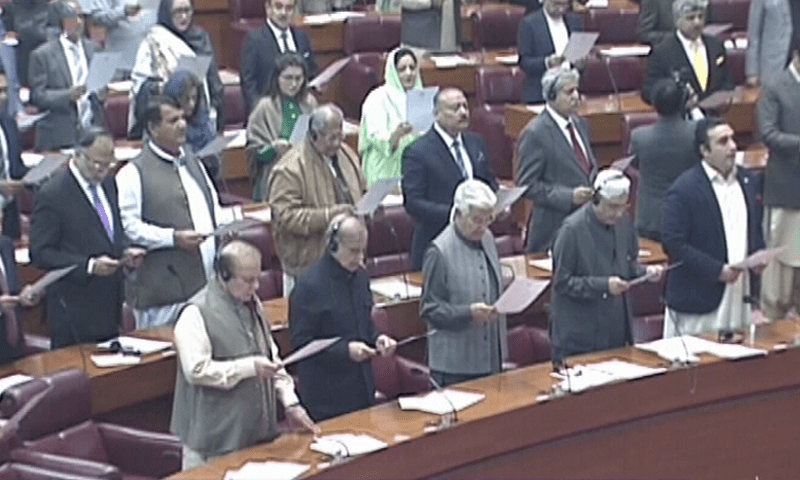Shaky start for Pakistan’s new parliament
The National Assembly held its first session today, despite opposition from Imran Khan's supporters. Maryam Sharif, daughter of the former three-time prime minister Nawaz Sharif, becomes the chief minister of Punjab, a role that makes her the family’s political heir, while her uncle is likely to be picked as prime minister tomorrow. For experts, the government will have to urgently address two issues: rising violence in some provinces and the search for economic stability.
Islamabad (AsiaNews) – The members of Pakistan's newly elected National Assembly (NA) met today for the first time since the 8 February elections, despite a series of issues involving the Pakistan Tehreek-e Insaf (PTI) party, which won most votes, with its leader, former Prime Minister Imran Khan, locked up in Rwalpindi prison since August facing scores of legal cases that his supporters believe are politically motivated.
The new NA begins with a handicap. The outgoing President of Pakistan, Arif Alvi, comes from the PTI, and refused to convene the session, which by law must meet within 21 days of the elections, because the 70 seats reserved for women and minorities, some of which will go to the PTI, have not yet been assigned.
Outgoing National Assembly Speaker Raja Pervez Ashraf presided over the session, during which the new speaker and deputy speaker were set to be elected. The posts of prime minister and deputy prime minister will be decided tomorrow.
Legislators loyal to Imran Khan arrived clad in masks bearing the likeness of the 71-year-old former cricket star.
No surprises are expected regarding the choice of the head of government after the country's two main parties, the traditionally centre-right Muslim League of Pakistan-Nawaz (PML-N) and the centre-left Pakistan Peoples Party (PPP) formed a coalition with three smaller parties against the “independent” candidates, banned from running under the PTI’s symbol in the elections.
It is likely that outgoing Prime Minister Shehbaz Sharif will be picked as prime minister; he took over from Khan after the latter's ouster in April 2022 in a no-confidence vote. The PPP’s Asif Zardari might serve as deputy prime minister.
Still political turmoil is expected to continue. Khan's supporters have recently boycotted some provincial assemblies and could continue to frustrate the new government and what Pakistani newspapers call "the establishment", i.e. the military, which in Pakistan, even decades after the end of military dictatorships, holds the last word in politics.
Meanwhile, the Sharif family is working hard to remain politically relevant. On Monday, Maryam Sharif was elected chief minister of Punjab. She is the daughter of Nawaz Sharif, the PML-N leader and three-time former prime minister whose brother, Shehbaz, is slated to be reappointed to the post of prime minister.
Maryam Sharif, 50, is the first woman and the fourth member of her family to occupy the post; in the past, it served as a springboard for the office of prime minister.
In addition to being the province of origin of the Sharif family, Punjab is also home to 53 per cent of Pakistan’s population, contributing 60 per cent to the GDP.
The appointment of the new political heir to the Sharif dynasty was boycotted by the Ittehad Council party, which included PTI candidates.
In 2017, she was convicted of possession of undeclared assets abroad along with her father and served time in prison before the sentences were overturned.
After Nawaz Sharif left for London in 2019 (ostensibly for medical treatment, but most likely to escape further legal woes), Maryam began her political battle against Imran Khan's PTI, focusing on a greater party presence on social media, where, despite frequent Internet shutdowns by the authorities, Khan continues to be very popular.
Some observers note that the new government will have to focus on rising violence and attacks in some parts of the country, like Balochistan, home to several ethnic minorities who took to the streets for weeks to protest the economic situation as well as the election results of 8 February.
So far, Pakistan has relied on loans from the International Monetary Fund to avoid financial default; yesterday, the acting finance minister announced that China had agreed to extend a US$ 2 billion loan due in March.
According to the latest estimates, Pakistan's external debt stands at US$ 125 billion, with at least US$ 24 billion to be repaid by November 2024, while inflation continues to exceed 30 per cent.
It is likely that further loans from traditional allies (like the United Arab Emirates) will only be granted after structural reforms are implemented, including tax increases and the privatisation of companies in difficulty, all of which is likely to spark greater discontent and weaken the new government.
16/07/2024 18:38







.png)










